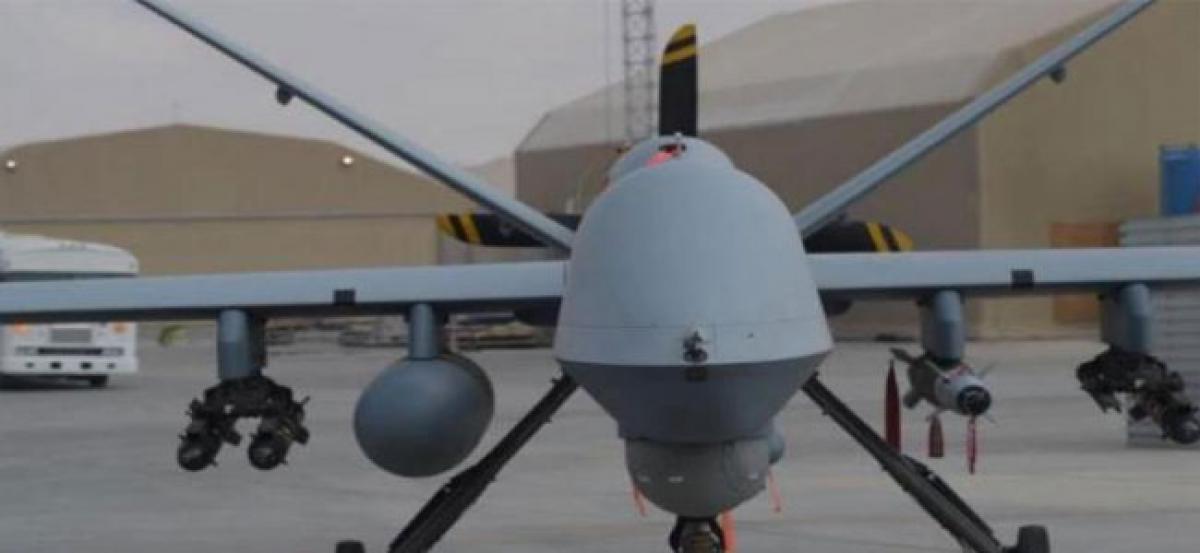Live
- Oppn misleading people, says PM
- Telangana CM Revanth Reddy Suggests Prioritizing the Most Needy for Indiramma Housing Scheme
- Telangana School Holiday: SFI Announces Bandh on November 30 Over Food Poisoning Cases
- NIT Warangal Library Trainee Recruitment: Last Date for Applications Tomorrow
- Singareni Recruitment 2024: Notification for 64 Internal Job Vacancies Application Deadline Announced
- A Teenager's Fight for Justice: Hyderabad Court Sentences Father to Life for Heinous Crime
- The Role of AI in Diagnostics, Treatment, and Patient Care
- Freshers’ Day Celebrations at Palem Agricultural Polytechnic College.
- Pearl Academy and Tech Mahindra Collaborate to Establish Makers Lab in Bengaluru
- “The Best Time to Start Retirement Planning is Now”, Says HDFC Life’s Latest Campaign
Just In

The United States has offered India the armed version of Guardian drones that were originally authorised for sale as unarmed for surveillance purposes, a senior US official and an industry source told Reuters
If the deal comes to fruition, it would be first time Washington has sold a large armed drone to country outside NATO alliance.
Farnborough/ New Delhi: The United States has offered India the armed version of Guardian drones that were originally authorised for sale as unarmed for surveillance purposes, a senior US official and an industry source told Reuters.
If the deal comes to fruition, it would be the first time Washington has sold a large armed drone to a country outside the NATO alliance.
It would also be the first high-tech unmanned aircraft in the region, where tensions between India and Pakistan run high.
In April, President Donald Trump’s administration rolled out a long-awaited overhaul of US arms export policy aimed at expanding sales to allies, saying it would bolster the American defence industry and create jobs at home.
The plan included a new drone export policy that allowed lethal drones that can fire missiles, and surveillance drones of all sizes, to be more widely available to allies.
One administrative hurdle to the deal is that Washington is requiring India to sign up to a communications framework that some in New Delhi worry might be too intrusive, the US official said.
The drones were on the agenda at a cancelled meeting between Indian and the US ministers of state and defence that was set for July, the sources said. The top level meeting is now expected to take place in September.
Last June, General Atomics said the US government had approved the sale of a naval variant of the drone. India has been in talks to buy 22 of the unarmed surveillance aircraft, MQ-9B Guardian, worth more than USD 2 billion to keep watch over the Indian Ocean.
Besides potentially including the armed version of the drone, the sources said the number of aircraft had also changed.
An Indian defence source said the military wanted a drone not just for surveillance but also to be able to hunt down targets at land and sea. The military had argued the costs of acquisition did not justify buying an unarmed drone.
The cost and integration of the weapons system are still issues, as well as Indian assent to the Communications Compatibility and Security Agreement (COMCASA) which Washington insists on as a condition for operating advanced defence systems.
India, the defence source said, has shed its opposition to the agreement after an assurance from the United States it would apply largely to US-procured weapons systems such as fighter planes and drones and not to the large Russian-origin equipment with the Indian military.
US drone manufacturers, facing growing competition overseas, especially from Chinese and Israeli rivals which often sell under lighter restrictions, have lobbied hard for the changes in US export rules.
Among the changes will be a more lenient application by the US government of an arms export principle known as “presumption of denial.” This has impeded many drone deals by automatically denying approval unless a compelling security reason is given together with strict buyer agreements to use the weapons in accordance with international law.
A second US official said the new policy would “change our calculus” by easing those restrictions on whether to allow any given sale.
The MTCR – a 1987 missile-control pact signed by the United States and 34 other countries – will still require strict export controls on Predator-type drones, which it classifies as Category 1, those with a payload of over 1,100 pounds (500 kg).
However, the Trump administration is seeking to renegotiate the MTCR accord to eventually make it easier to export the larger armed drones.
The head of Pentagon’s Defense Security Cooperation Agency (DSCA) told Reuters at the Farnborough Airshow that he was unable to comment on any pending deals that had not been notified to Congress.

© 2024 Hyderabad Media House Limited/The Hans India. All rights reserved. Powered by hocalwire.com







